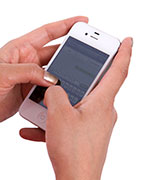Two studies demonstrate some improvement in sun protection behaviors
WEDNESDAY, Jan. 28, 2015 (HealthDay News) — A smartphone application providing real-time advice about sun protection offers some improvement in sun protection behaviors, according to two studies published online Jan. 28 in JAMA Dermatology.
David B. Buller, Ph.D., from Klein Buendel Inc. in Golden, Colo., and colleagues conducted a randomized pretest-posttest controlled trial of a smartphone mobile application (Solar Cell) providing personalized, real-time sun protection advice. Six hundred four non-Hispanic and Hispanic adults from a nationwide survey panel were enrolled. The researchers found that, compared with controls, individuals in the treatment group reported more shade use (P = 0.03) but less sunscreen use (P = 0.048). No significant difference was seen in the number of sunburns in the past three months (P = 0.87). Mobile app users reported spending less time in the sun and more use of all protection behaviors combined (both P = 0.04).
In a second study, Buller and colleagues evaluated the smartphone mobile application Solar Cell in a randomized clinical trial. Participants were recruited nationwide and followed up at three and eight weeks after randomization. The researchers found that, compared with control participants, participants in the intervention group used wide-brimmed hats more at seven weeks (P = 0.045). Compared with men, women who used the mobile application reported more combined use of all sun protection (P = 0.04). Men and older individuals reported less use of sunscreen and hats (P = 0.02 and 0.03, respectively).
“Strategies to increase the use of the mobile application are needed if the application is to be deployed effectively to the general adult population,” the authors write.
Buller disclosed financial ties to Klein Buendel, the developer of the Solar Cell app used in both studies.
Copyright © 2015 HealthDay. All rights reserved.








